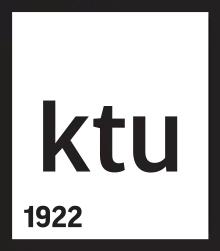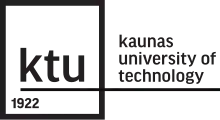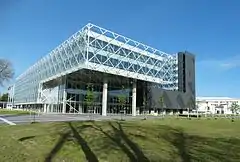Kaunas University of Technology
Kaunas University of Technology (KTU) is a public research university located in Kaunas, Lithuania.
Kauno technologijos universitetas | |
 | |
| Motto | Scientia, ingenium, virtus |
|---|---|
Motto in English | Knowledge, ability, strength |
| Type | public |
| Established | 1922 |
| Rector | prof. Eugenijus Valatka |
| Students | more than 9 000 (according to 2019 data) |
| more than 300 (according to 2019 data) | |
| Location | , |
| Affiliations | CESAER, ECIU, NORDTEK, EUA, SEFI |
| Website | ktu.edu |
 | |
Initially established on January 27, 1920, the school was known as "Higher Courses". With an increased rate of staffing and attendance, the school was instituted as the first independent higher education institution within Lithuania by the government on February 16, 1922. Renamed Vytautas Magnus in 1930, the university specialized in four areas: civil engineering, mechanics, electrical engineering, and chemical technology. The turmoil of World War II brought combinations of Soviet, then German, and finally Soviet re-occupation, numerous name changes and an eventual closing of the university in 1943. After re-occupation by the Soviets in 1944, the University reopened and eventually reformed into Kaunas Polytechnic Institute (KPI) and Kaunas Medical Institute in 1946. Under the influence of Perestroika, the Soviet Lithuanian government reinstated the school's university status, and it was renamed the Kaunas University of Technology (KTU). Independence from the Soviet Union brought rapid westernization with a flexible module/credit system and membership to many Western European organizations.
History
The Higher Courses
Z. Žemaitis, a mathematician, and J. Vabalas-Gudaitis, a psychologist, with other intellectuals founded the first centre of studies in Kaunas – the Higher Courses. Among other subdivisions, the Courses included a technical section directed by engineer J. Šimoliūnas. The Higher Courses enjoyed successful growth and in two years they already had 480 students and 48 teachers.
On February 16, 1922 the government of Lithuania passed a resolution establishing the school as a university. The president of Lithuania A. Stulginskis appointed Dr. J. Šimkus as the first rector of the university with Monsignor J. Mačiulis-Maironis as the dean of Theology, A. Voldemaras as the dean of Social Sciences, Z. Žemaitis as the dean of Mathematics and Natural Sciences, P. Avižonis as the dean of Medicine, and P. Jodelė as the dean of technology.
Vytautas Magnus University
On June 7, 1930 the university was named Vytautas Magnus University. The university then consisted of seven faculties consisting of the Faculty of Theology and Philosophy, Faculty of Evangelical Theology, Faculty of Humanities, Faculty of Law, Faculty of Mathematics and Natural Sciences, Faculty of Medicine and Faculty of Technology.
The beginning of 1940 saw the reorganization of Vytautas Magnus University with The Faculties of Law and Humanities being transferred to the University of Vilnius.
World War II
On August 21, 1940, with occupation by the Soviet Union, the Lithuanian Soviet Socialist Republic was instructed to rename school the University of Kaunas. In the fall of 1940 the Faculty of Mathematics and Natural Sciences was transferred to the University of Vilnius.
With German occupation in 1941,[1] the university was once more renamed Vytautas Magnus University with 5 faculties: Theology, Philosophy, Technology, Civil Engineering and Mathematics. On March 17, 1943 the University was closed, along with other Lithuanian institutions of higher education.
On November 13, 1944 the Lithuanian SSR occupational government reopened the University, and until 1946 it operated under the name of Kaunas National Vytautas Magnus University.
Kaunas Polytechnic Institute and Soviet Occupation
In June 1949 the Faculty of History and Theology was closed.
In 1950 the University of Kaunas was reorganized into Kaunas Polytechnic Institute (KPI) and Kaunas Medical Institute. Throughout Soviet occupation, the KPI resisted attempts at Russification and internationalization and strove to preserve the old European university spirit, national academic traditions, and teaching in the Lithuanian language.[2]
Kaunas University of Technology

In 1990 KPI was named Kaunas University of Technology (KTU), regained its university status, and embarked on the road to reforms of studies and science.
In 1992 the university, in accordance with the Law on Science and Education of the Republic of Lithuania, started implementing a two-level degree program of higher education and a new procedure of awarding research degrees and academic titles.
In 1993 a Western flexible module and credit study system was implemented with emphasis on the unity of studies and science, broad fundamental education, liberal study programmes and independent study.
In 1998 the university joined Magna Charta of the European Universities and became a member of the European University Association and the International Association of Universities.
Structure
Kaunas University of Technology has 122 study programmes, of which 48 are Bachelor’s, 54 are Master’s, 19 are Doctoral and 1 – non-degree student programmes. 56 of them are taught in English.
University has more than 9,000 students, of which more than 6,600 are Bachelor’s, 2,000 are Master’s and 320 are Doctoral students. 6,5 % of them are foreign.[3]
All of that fits into 9 faculties of KTU.
Faculties
- Faculty of Chemical Technology
- School of Economics and Business
- Faculty of Electrical and Electronics Engineering
- Faculty of Informatics
- Faculty of Mathematics and Natural Sciences
- Faculty of Mechanical Engineering and Design
- Faculty of Social Sciences, Arts and Humanities
- Faculty of Civil Engineering and Architecture
- Panevėžys Faculty of Technologies and Business
KTU engages in research of physical, technological and social sciences, and experimental development, while research of biomedical sciences and humanities is also promoted. All of that fits into 8 research institutes of KTU.
Institutes
- Biomedical Engineering Institute
- Institute of Aviation & Aeronautical
- Food Institute
- Institute of Architecture and Construction
- Institute of Environmental Engineering
- Institute of Materials Science
- Institute of Mechatronics
- Prof Kazimieras Baršauskas Ultrasound Research Institute
- Health Telematics Science Institute
Rankings
| University rankings | |
|---|---|
| Global – Overall | |
| QS World[4] | 751-800 |
| THE World[5] | 1001+ |
| USNWR Global[6] | 1245 |
KTU is currently ranked 751-800 among World top universities by 2019 QS World University Rankings.[7]
Events and achievements
- In 1998 the KTU Regional Business Incubator was established. It is the first technological business incubator in Lithuania, providing support to enterprises interested in starting new businesses.[8]
- In 2008 prof. Rymantas Jonas Kažys[9] was awarded with the National Award for Partnership Advancement for creating technologies of supersonic measurement and diagnostics and for the commencement of European scientific research and practice.
- In 2008 KTU Institute of Environmental Engineering received the Energy Globe 2008 National Award for its preventive energy saving and waste minimization innovation development and implementation system APINI- SPIN.
- In 2010 prof. Jurgis Kazimieras Staniškis, head of the Institute of Environmental Engineering, was awarded the Baltic Sea Award 2010.[10] Prof. Staniškis is currently the only Lithuanian scientist to receive this award, which goes annually to an individual or organization for putting research findings into practice, technical decisions or other activities that contribute substantially to the Baltic Sea and the sustainable development of the region.
- In 2010 an agreement on the Integrated Science, Studies and Business Center (Valley)[11] of Santaka sponsorship of the first investment project was signed. The implementation of this project will result in the establishment of a world-class National open-access R&D Center within the KTU Student Campus in Kaunas. The Center will primarily focus in such areas as sustainable chemistry, mechatronics, information and communication technology, and sustainable energy resources, which are a substantial part of the Lithuanian economy and comprise a significant part of its export.
- On the 13 October 2017, Klaus Schwab, head of the World Economic Forum, became the 45th Honorary Doctor of Kaunas University of Technology for "spreading the knowledge on economy and innovative ideas, for fostering social entrepreneurship and support for young businesses, and for his contribution into developing the concept of the Fourth Industrial Revolution".[12][13]
Notes and references
- "Kaunas: dates and facts. Electronic directory". Datos.kvb.lt. Retrieved 2015-07-31.
- "KTU history". Museum. Retrieved 2019-01-30.
- "Apie KTU vienu žvilgsniu | Kauno technologijos universitetas". Kaunas University of Technology. Retrieved 2019-01-30.
- World University Rankings 2018
- US News Rankings 2018
- "Kaunas University of Technology". Top Universities. 2015-07-16. Retrieved 2019-01-30.
- https://web.archive.org/web/20110722151647/http://www.ktc.lt/4086/about-ktc/history.html. Archived from the original on July 22, 2011. Retrieved January 18, 2011. Missing or empty
|title=(help) - "Ministry of Education and Science". Smm.lt. Retrieved 2015-07-31.
- "Professor Klaus Schwab, the Founder of WEF to Become the 45th Honorary Doctor of KTU". Archived from the original on 22 December 2020.
- "Prof K. Schwab, founder of WEF to become the 45th Honorary Doctor of KTU". The Lithuania Tribune. 5 October 2017. Archived from the original on 22 December 2020.
External links
| Wikimedia Commons has media related to Kaunas University of Technology. |
- (in English) Official website of Kaunas University of Technology